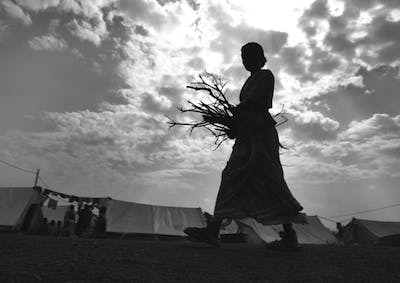We know refugees need food, water, shelter, and medicine, but less attention is paid to their energy and cooking needs. In advance of World Refugee Day on June 20, I sat down to talk to Radha Muthiah, Executive Director of the Global Alliance for Clean Cookstoves, about what this means for families living in refugee camps and other humanitarian contexts.
Jenni Lee: I was shocked to learn that in some camps it’s been reported that girls and women can spend up to five hours a day collecting firewood for cooking – and that they face increased risk of violence because they are outside the relative safety of the camps. What shocks you about this problem? How else does the lack of cooking fuel and stoves impact refugees and displaced people?
Radha Muthiah: The Global Alliance for Clean Cookstoves works on the issue of access to safe, reliable energy both in humanitarian and non-humanitarian settings. There are some similar challenges girls and women face in both settings when they’re using open fires or rudimentary stoves for cooking.
Even in a regular setting, women who go out early in the morning and collect wood are at risk of human and animal attacks. The dangers are heightened in a refugee setting. It’s not just the amount of time it takes, but increasingly with deforestation, they’re traveling further from the camp. And the dangers occur the further out they walk. In Chad, some studies have documented that approximately 90 percent of all rapes occur as women are going out to collect their fuel.
JL: The good news is that there are solutions that can make a difference to families. Can you explain what access to improved cookstoves and fuels can mean for refugee families?
RM: Number one, when you have increased access, the risks of personal harm and injury go down considerably. Having a more efficient stove that uses less fuel means a woman doesn’t have to go out every day to collect her fuel.
Second, when you’ve got something that cooks more efficiently, you’ve got more time on your hands. It really gets to the notion of empowerment for women – it’s your choice what to do with this time. Then there is a potential livelihood benefit. With more time, you may choose to engage in income-generating activities.
Third, clean cookstoves and fuels can provide financial savings. In some instances, you may walk out to collect your fuel; in other instances, you may actually purchase fuel. Others may go out to get wood and come back and sell it to other refugees. With a more efficient stove, you don’t have to buy as much wood.
JL: How is the Global Alliance for Clean Cookstoves working with the United Nations to support refugees?
RM: For the refugee population, it’s crucial to work with various UN agencies. We could think of no better partner. They understand the needs of the humanitarian population, how to work with refugees, the systems that will be put in place, etc.
In terms of what we are doing, we have all gotten together to understand what each party can bring to the table. In the past there wasn’t this larger-scale coordinated effort, but now we’re able to sit down and understand what each party’s role will be.
Together we’re saying: We’ve done really well when it comes to developing systems to get shelter, water, and sanitation out in any refugee camp. Now let’s do the same for energy-related services.
The Alliance is raising funds and awareness around the need to transition to more efficient stoves and alternative fuels. We’re also documenting evidence of the impacts of cleaner and more efficient stoves in refugee settings, so there’s a body of evidence to scale up solutions. And we’re doing a lot of training with relief workers about how to explain the benefits of more efficient stoves and alternative fuels to refugees as they come into a camp.
JL: Why is the Alliance focused on this issue? What motivates you to help refugees?
RM: The Alliance has a broad goal of 100 million households adopting clean and efficient cooking solutions by 2020. We want to catalyze a market where everybody stands to benefit, but we know certain groups of vulnerable populations can’t immediately participate in that market because of conflict or other humanitarian disasters.
We don’t want to leave out vulnerable groups. Their needs are quite great. So we are developing programs to specifically cater to those needs.
When you’ve been removed from a familiar situation to something that’s completely different, the last thing you want to do is travel kilometers and miles to gather your fuel in unknown territory. I’ve personally seen the impact this has on women and their sense of confidence and ability to take care of their families. This has motivated me to ensure that the Alliance has a slice of its strategy focused on the cooking and energy needs of humanitarian populations.
Editor’s Note: Recently, the Global Alliance for Clean Cookstoves joined the UN Refugee Agency and a global partnership to increase access to safe and reliable energy for families affected by crisis. Learn more here and by following @cookstoves on Twitter and Facebook.com/Cookstoves.



 View All Blog Posts
View All Blog Posts